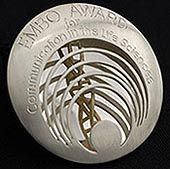SEQUENOM and UCSD Collaborate on High-Throughput Mutation Detection Study in E. Coli
MassARRAY(R) System Chosen to Conduct Research Due to Speed, Sensitivity and Accuracy
Advertisement
SEQUENOM, Inc. reported that University of California San Diego (UCSD) bioengineers and scientists from the Company have published the successful use of SEQUENOM's MassARRAY(R) system to conduct fully automated high throughput mutation detection in microbial genomes, specifically the bacterium Escherichia coli- K12 (E. coli). The publication in the December 2004 issue of Genome Research reports this comparative sequencing study as among the fastest and most sensitive of its kind. The superior performance of the MassARRAY system established the potential for scientists to analyze genetic changes in bacteria and other disease causing organisms, which will be an essential step in conquering infectious diseases an/prnh/20040415/SQNMLOGO)
Bernhard Palsson, Ph.D., Professor of Bioengineering at UCSD chose the MassARRAY system as the preferred comparative sequencing method. The MassARRAY system allows the fully automated detection of sequence deviations from given reference sequences and facilitates parallel screening of multiple samples. For conventional gel sequencing, a significant amount of time is spent manually reviewing sequencer readouts to interpret ambiguities. SEQUENOM's MassARRAY system is designed to automatically list any deviations identified in the comparative sequence to facilitate and accelerate analysis. As a result, no human intervention is required for primary data analysis.
"This research represents the first time our MassARRAY technology has been used to conduct high throughput genetic analysis of bacteria, demonstrating the versatility of our system. We know how well our system performs analyzing human DNA, and are pleased that the scientists at UCSD relied on the throughput and accuracy of our system to conduct this novel microbial genomic research," said Charles Cantor, Ph.D., Chief Scientific Officer of SEQUENOM. "We believe this research forms an excellent foundation for large scale comparative sequencing, which will eventually lead to a better understanding of the pathogenicity of organisms and identify mutations that lead to antibiotic drug resistance."
"Our research team at the Department of Bioengineering at UCSD traced the genetic basis for bacterial evolution and the outcome of adaptive evolution in E. coli," stated Dr. Palsson. "SEQUENOM's MassARRAY system was implemented to collect a genotypic dataset for a more in depth understanding of the genotypic-phenotypic relationship, which is fundamental in biology. We are planning to utilize the MassARRAY system in the future for studies on the evolutionary trajectory of the detected mutations. Additional studies on pathogens have the potential to provide a mechanistic basis for pathogenesis and management of disease."
Genetic analysis of bacteria, viruses and other disease causing organisms represents a major commercial opportunity for SEQUENOM's MassARRAY technology. Originally developed as a genotyping platform, the continually expanding portfolio for the MassARRAY technology now includes microbial typing, mutation detection, gene expression profiling, genetic trace analysis, and epigenetic analysis.






















































